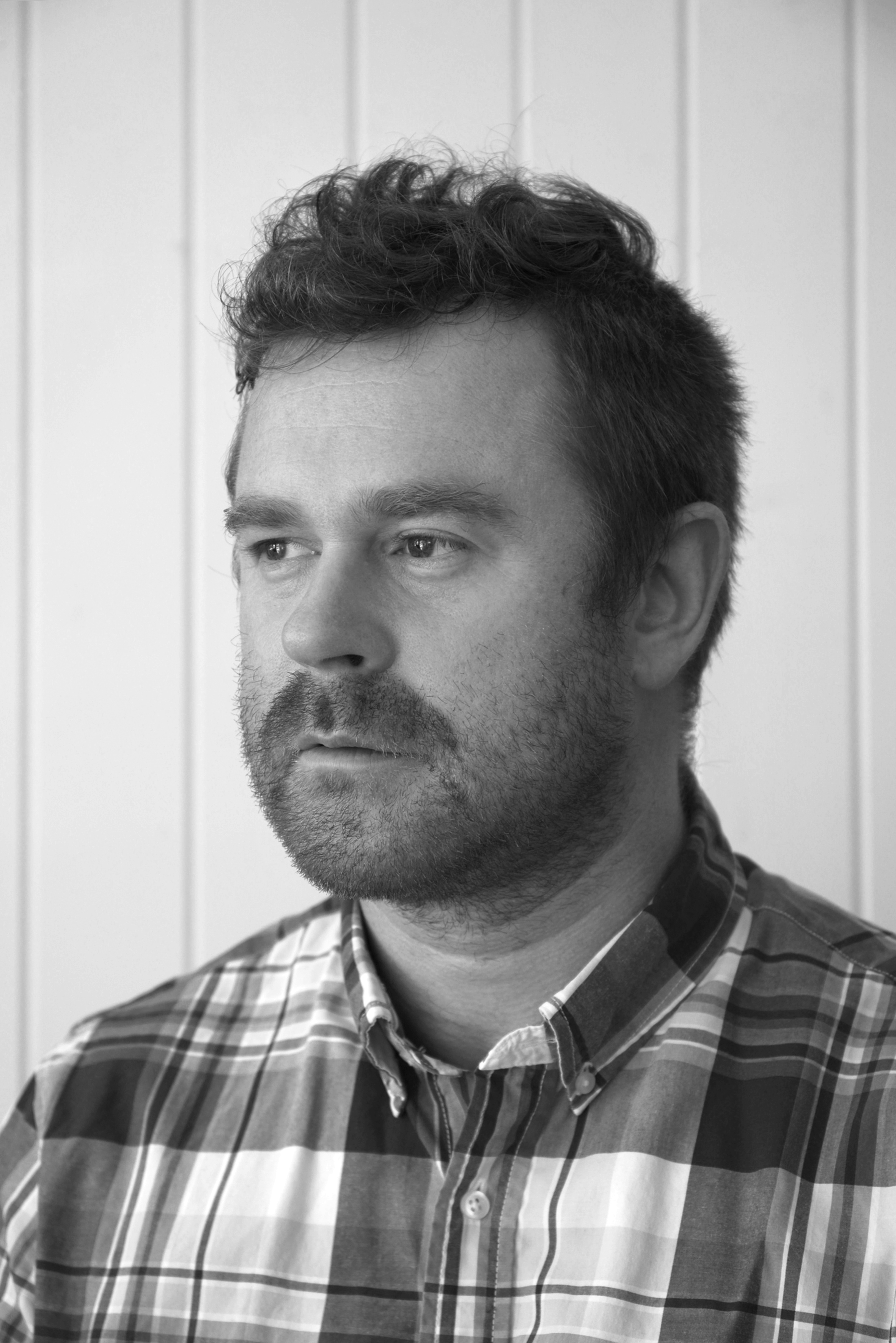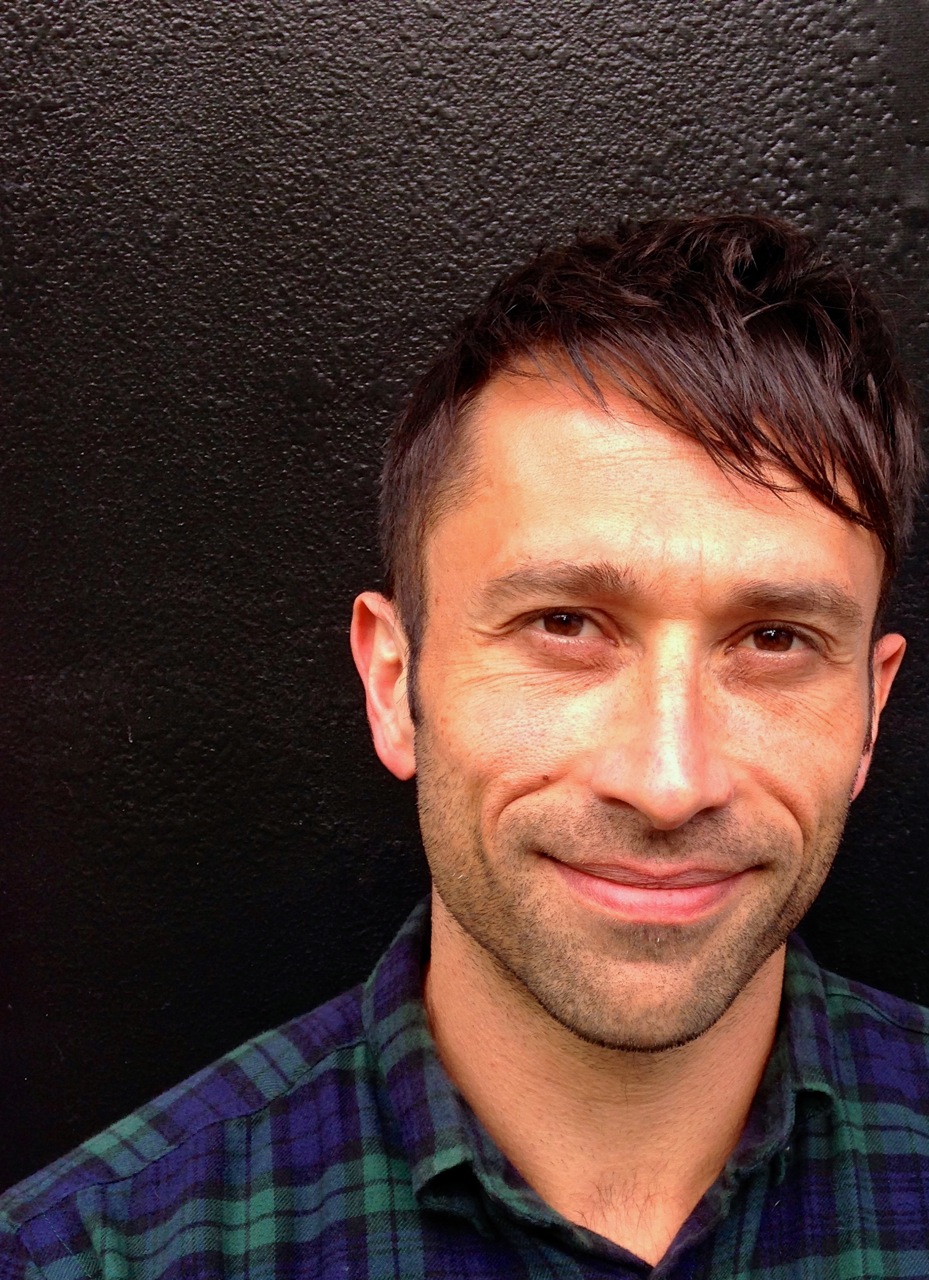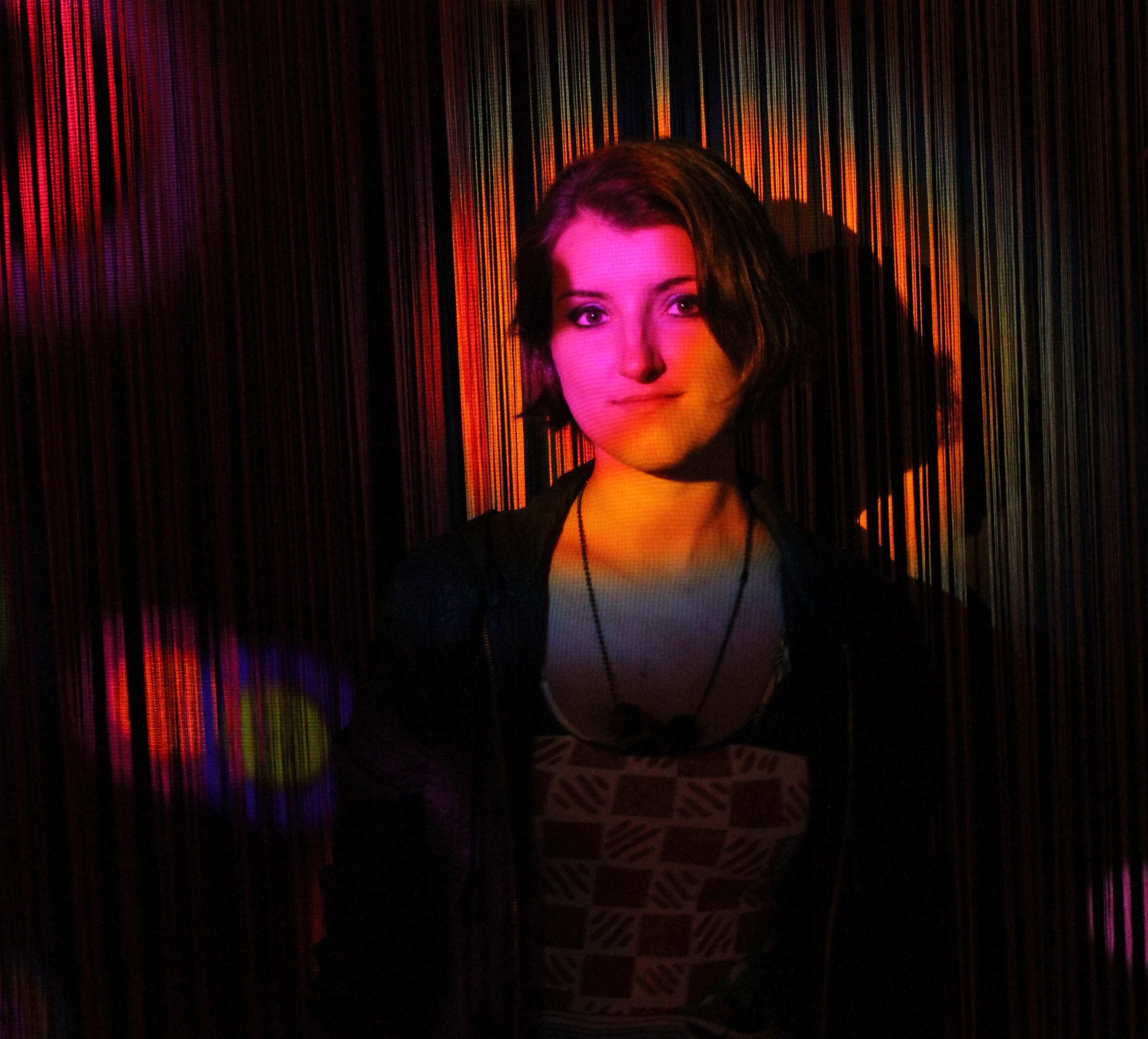The Sky Had Turned Pale Green by Emily O’Grady
 Emily O’Grady is a PhD candidate at Queensland University of Technology, where she won the 2012 Undergraduate, and the 2013 Postgraduate Writing Prize. Her fiction and poetry have been published in The Lifted Brow, Voiceworks, and Award Winning Australian Writing.
Emily O’Grady is a PhD candidate at Queensland University of Technology, where she won the 2012 Undergraduate, and the 2013 Postgraduate Writing Prize. Her fiction and poetry have been published in The Lifted Brow, Voiceworks, and Award Winning Australian Writing.
The Sky Had Turned Pale Green
When the drama captain dived into a shallow swimming pool in my final year of school the chaplain held a vigil in the chapel every lunch break. Each afternoon we gathered around a battery operated candle on the teal carpet in a blobby oval, offering significant memories while eating toasted sandwiches from the tuckshop and passing around a packet of Minties or Snakes. Each session began with two minutes of silent reflection and a meditative Angelus. When it was my turn to contribute I pretended I was too distraught to speak.
The vigils came to an end when she woke as a quadriplegic twelve days afterthe fall. The administration organised a free dress day to raise money for her family to renovate their bathroom, and renamed the end of year Cabaret in her honour. On graduation her parents dressed her in the school tracksuit and styled her short hair into a braided stump for the occasion. No one had thought of a ramp to get her on the stage so she sat by the bottom of the stairs—her parents gripping her shoulders—while a scrolled diploma tied with a purple ribbon was placed in her lap and subsequently rolled onto the floor. I couldn’t tell if the mood was one of mourning or celebration. She wasn’t wearing shoes, and I remember looking at her socked feet and thinking of sleeping lambs.
Everyone seemed to indulge in the witchy ritual of the vigils and pawed over the tragedy, debating fate and God and euthanasia in the hallways and beneath the ancient, Moreton Bay fig that left a bed of glossy leaves across the brick paths. When Felicity had drowned at the end of Year Nine, her funeral was held during the Christmas holidays, so by the time the New Year came around the murky disbelief had already lifted and any opportunity for bonding or existential discussion was avoided. Though the start of term mass was combined with a memorial service, because she’d only been at the school a few months there were no significant memories for anyone to share. Up until graduation Felicity was spoken of rarely and abstractly, as though she were a hazily remembered dream or a childhood memory you couldn’t be sure wasn’t one you’d absorbed from the television.
Felicity and I knew each other through the kayaking club. Every Friday we paddled a kilometre downstream and drifted along Norman Creek. I’d been kayakingsince Year Eight, but it wasn’t until Felicity began boarding at the College that I’d come to tolerate those afternoons sweating into the Brisbane River. It was mandatory for every student to play an extracurricular sport unless they had a medical certificate. I chose kayaking because for the most part it wasn’t a team activity, and even in April and October the heat could be so oppressive that the thought of hockey or touch on the oval was unbearable.
We kayaked three afternoons a week. On Monday and Wednesday we trained for the interschool competitions held every few months, while the Fridays on Norman felt like a holiday from the repetition of sprints along the bank. The creek was always dank with mangroves, and rotting jetties that led to shacks with weathered Tibetan prayer flags strung from their porches. Cans of XXXX bobbed on the water like golden, mangled logs. When we got too close to the mangroves the tips of our paddles would stick in the silty sludge that reeked of sulphur. The creek was always silent but for the chug of the coach’s tinnie, the slurp of fibreglass being suctioned from black mud.
Felicity boarded at the College even though her parents lived in a townhouse on the other side of the river. The other boarders were from out west, or from the Torres Straight and Pacific Islands, and had home visits only for term holidays and sometimes long weekends. At the end of each week, instead of going to the boarding house Felicity would skulk up the ridged boat ramp, bare feet slick with river water, to the school gates where her mother would be waiting with a taxi.
One afternoon I followed her from the water. While the rest of the team capsized into the river in ritualistic unison, Felicity dumped her kayak on the green turf pontoon and headed to the boatshed. She never capsized, not even on purpose.
She stood by the paddle rack, fingering the fibreglass cuts along her legs: swollen welts with glistening slivers prickling the skin. I unbuckled my lifejacket and took a sip from the bubbler. The water was warm and tasted of chlorine. Felicity leant against the cement wall and wiped her wrist under her nose.
‘God, this is such rubbish,’ she said.
‘What is?’ I said.
‘This,’ she said, gesturing to nothing.
‘Did you capsize?’ I said, knowing she hadn’t.
‘No,’ Felicity said. ‘But I’m itchy.’
‘Here,’ I said, handing her a greasy bottle of baby oil from the first-aid kit. ‘You’ll get used to it.’
Felicity shrugged. She flicked open the cap with her teeth and poured oil into her hand. It pooled in her palm and leaked over her fingers.
‘Have you kayaked before?’ I said. ‘You’re pretty good.’
‘Christ no,’ she said, glazing oil onto the cuts. ‘I hate water.’
She threw the baby oil back into the first aid kit and wiped her hands on her ruggers. From the pontoon I could hear girls capsizing, shrieking like seabirds as they plunged themselves fully clothed into the river.
Though my older sister went to a public school my parents had transferred me to the all-girls Catholic College halfway through Year Eight. While most girls complained of the school’s severity I found it calming, as though I were a baby being swaddled. Jewellery and nail polish were against the dress code, and if a teacher suspected you were wearing makeup you were marched to sick bay to strip it off with witch hazel and a fistful of cotton balls.
Rather than rebelling against the rules, it evoked a sense of ferality amongst even the prettiest girls. At lunchtime they’d strip down to their underwear on the H block verandas to change into their sport uniforms. When it rained, they made no effort to take shelter, and came to class with mud-flecked calves and their bras fluorescent under soaked blouses. During dissections in Science, a particular clique even hacked the tails off their rats and kept them as talismans, the limp flesh creeping out of breast pockets like thin, white fingers.
On her first day of school Felicity was fawned over.
‘You’re like a little doll,’ the girls said, as they draped Felicity’s hair over their own straw-like ponytails and compared the pale underbelly of her forearms to their freckled sunburns. At lunchtime they bought her cartons of chocolate milk from the tuckshop, manically grabbing at her clothes and hands to get her attention. But it wasn’t long before Felicity’s shine dulled, and after a few days no one was interested in her strange inflections or the way her fingers were like polished twigs.
My parents felt sorry for Felicity. Whenever she came over after training my mother cooked fancy meals from recipe books and had us sit at the table to eat. My sister bombarded Felicity with questions about her father’s job in Japan. My father switched off the races.
One night after dinner I sat in the bathroom with Felicity as she drew on her eyebrows with a black eye pencil. Most mornings she shaved them off with a disposable razor. When she hadn’t shaved them for a few days she compulsively ran her fingertips over the stubble.
‘Your family are really nice,’ she said, sketching the pencil along her brow.
‘They’re alright,’ I said. ‘They get so excited when you’re here.’
‘Your sister’s so pretty,’ she said. ‘Why don’t you go to the same school?’
‘I went for a while. They were all morons.’
‘Did you have any friends?’
‘Course I did.’
‘It was just a question,’ Felicity said, raising her eyebrows to her reflection.
‘I had this one friend but she was totally mental,’ I said. ‘We were playing Mercy one day and one of her wrists snapped.’
‘What’s Mercy?’
‘Here,’ I said. I grabbed Felicity’s wrists and laced her fingers through mine. I gripped her knuckles between my fingers and twisted until a knuckle cracked. ‘Like that,’ I said, freeing her hands. ‘But harder.’
‘That’s awful,’ she said. ‘Why would you do that?’
‘It’s a game.’
‘Pretty weird game.’
‘It was kind of funny,’ I said, washing my hands in the sink. ‘Plus, her bones were like little sticks.’
‘Did you get into trouble?’
‘It wasn’t my fault,’ I said. ‘She was so skinny.’
I flicked my wet fingers into Felicity’s face and she elbowed me at the waist. She’d changed back into her uniform after kayaking, and wore the blueberry skirt unbuttoned and low on her hips like how the other girls at school wore theirs. A strand of hair fell from her elastic and into her eye. She tucked it behind her ear and peered at herself in the mirror.
‘Your teeth are so white,’ I said. ‘Like little pearls.’
Felicity began to take kayaking as seriously as the seniors training for States. She was always at the front of the pack unless I convinced her to lag behind with me, and she never skipped training, not even if she had a cold. After a while her shoulders and stomach thickened from lifting weights on the scraps of dusty carpet in the boatshed.
‘I’m so fat,’ she said one night at a sleepover, pinching the skin of her thighs.
‘Well, you’re pretty so it doesn’t matter anyway,’ I said.
‘My mum says I’m getting fat.’
‘Who cares?’
‘I’m sick of kayaking,’ she said, collapsing back on the bed.
‘You better not have any of these then.’ I tore open a packet of Tim Tams and bit into one. The chocolate coating was mottled white from being in the fridge. It had no taste and the crumbling biscuit felt like ants in my mouth. Later, when Felicity went to the bathroom, I realised I’d been clutching the half-eaten Tim Tam in my hand the whole time. It had melted into my palm, a fistful of mud.
Unlike Felicity, most of the girls at school were soft and large. They took up space, sprawling their fleshy arms along desktops, hooking their feet around desk legs, skirts draped between their thighs. One of the girls had only four fingers on her left hand. We’d been in Girl Guides together for a short time in primary school. Despite her deformity the other girls had always given her the gifts we made on craft nights, trying to court her affection: flaking soaps moulded into pastel flowers and ducks, and splintered Paddle Pop stick photo frames.
One morning before Soc. Ed I saw Felicity staring at the hand. The girl was at the set of desks beside us, sifting through her hair for split ends and nibbling them off with her teeth. The hand was a rubbery pink, contorted into a stiff curl. She used it as a weapon, wrapping it around her friend’s necks, or scraping the splitting fingernails down their cheeks. She called it her paw.
When she saw Felicity staring, she jabbed the paw out.
Felicity turned back to her text book, but after a minute was gazing back across the desk as though hypnotised.
‘Can I touch it?’ Felicity said. She leaned over to where the girl was balancing on the back legs of her chair. The hand rested limply on the desktop like it wasn’t a living thing. Felicity moved her own hand tentatively. When she brushed the girl’s scaly palm with her fingertips Felicity jerked her hand right back as though the paw had electrocuted her.
‘Does it hurt?’ Felicity said.
‘Nah,’ the girl said. ‘It’s always been like that.’ She drummed her fingernails
against the desk and turned her chair towards Felicity. ‘Your dad lives in Japan, right?’
‘Only sometimes,’ Felicity said.
‘That’s so cool.’
‘I guess.’
‘We’re having chips in the park after school,’ the girl said. ‘Come if you want.’
‘Can’t,’ Felicity said. ‘I have kayaking.’
‘Too bad,’ the girl said, reaching into her pencil case. She unwrapped a pack of grape Zappos and placed a lolly on Felicity’s text book.
‘You should wear a glove,’ I said to the girl.
She ignored me and went back to her ratty hair. Felicity chewed on the Zappo and smoothed out the grey wrapper until it was ironed flat. Later, I wrote Felicity a note folded into a tiny square and flicked it on her desk, but she didn’t look up from copying off the whiteboard. When she yawned her tongue was stained purple in the centre like a pinch bruise.
The following week the river was thick with jellyfish. Usually the water was a dull brown, but it was close to clear, as though the blue blubbers were small moons illuminating the river.
‘Are they poisonous?’ Felicity asked as she rested her paddle along the pontoon, steadying the kayak as she clambered into the cockpit.
‘Only if you fall in,’ I said.
The water was choppy from the shock of frothy waves from City Cats zigzagging back and forth across the river. As we paddled along the bank I tried to spear the jellyfish with my blade. Every time I got close to slicing one it darted deep into the water.
‘You’ll make them angry,’ Felicity said. Her balance was shaky, and she kept her eyes fixed in front of her, not looking down. She’d forgotten to put on a lifejacket. Her thin shirt clung to her back.
‘They don’t have nervous systems,’ I said. ‘They don’t feel anything. How could they get angry?’
When we got to the mouth the rest of the team were already paddling deep in the creek. Because it was the end of term, instead of being in the tinnie the coach had taken a kayak and was leading the group. The sky above us was grey and as shadowy as the damp trees. The mangroves surrounding us like burnt forests.
At the first bend I stopped paddling. Felicity was in front of me. I prodded her in the back with my blade.
‘Let’s go back,’ I said. ‘We can paddle across the river. Go to the park.’
Felicity sighed and looked up into the trees.
‘Come on,’ I said. ‘It won’t take long.’
‘We’ll get in trouble,’ she said.
‘No one will notice us,’ I said, paddling beside her. ‘Look how far ahead they are.’ The last of the girls had turned around the second bend and were disappearing further up the creek.
‘I just don’t see the point,’ Felicity said.
‘What?’ I said.
‘I don’t want to,’ she said. ‘I don’t want to go with you.’
Felicity rolled her paddle along the cockpit rim, her water bottle sloshing between her feet. Falling, blackened leaves made tiny ripples in the still water. The string bracelet I’d weaved her twisted around her ankle like a multicoloured snake.
‘Fine,’ I said, reaching for the bottle at her feet. ‘Fine.’ The white food particles from Felicity’s backwash looked like Sea-Monkeys contaminating the water. I took a sip and the stale water felt thick and warm. I stared at Felicity’s shirt and she looked down as well. Goosebumps burst from her arms like lavender hillocks.
‘That was pretty stupid of you,’ I said, tightening the buckles of my own lifejacket. I tossed the water bottle into the mangroves and started turning and paddling up the creek, back onto the river. The sky had turned pale green, the infested water an expanse of eerie blue as translucent monsters riled beneath the surface.








